As we all know, parenting is a decades-long endeavor. But while this responsibility plays out over such an extended period, it’s often the early years that often prove to be the biggest challenge. This is especially true when you’ve got a headstrong child on your hands, which is definitely common with 5 year olds. Knowing how to discipline a 5 year old who’s strong willed without feeling like the bad guy is a balancing act.
Parenting a spirited child is a learning process that can change with each year of life. But this time around, I’m going to talk specifically about how you can promote good behavior and prevent power power struggles with your five-year-old child.
Read on to find a few tips that may help if you’ve been having a hard time with your kindergartener!
Why is My 5 Year Old Acting Up?
There are many reasons why the kindergarten age may be accompanied by some difficult behavior.
First, you might just have a stubborn child on your hands – if it’s an inherited personality trait, then you’ll have to work through it with them and be as patient as possible.
Another common explanation is that they’re changing and developing – at 5 years old, most kids are squarely out of the preschool stage and starting to gain more understanding of the world around them – which means more complex emotions, and more desire to make their own decisions and exercise their own will.
5 years old is also the start of kindergarten for a lot of kids, which means they’ll be exposed to a new set of rules and a lot of peers, some who will be good influences and others that may not be.
—–> Tips for Helping Transition to Kindergarten
It’s important to show up for your kid: talk to their teacher, meet their classmates, and keep tabs on who they’re playing with and if they’re positively or negatively affected.
Facing difficult situations and adjustments can cause a lack of good behaviour, even for the sweetest, most typically well-behaved children. Goodness knows, even older children and adults struggle with major life changes!
Remember that kids are extremely impressionable at this age and the best way to keep all your hard work from going to waste is to communicate with them and be there for them – you as their parents are still the biggest influence on them!
My favorite parenting resource book, Babywise, has a companion book for ages 3-7 called, Childwise. In it the author discusses the difficulty as a parent in distinguishing between childishness and defiance.
Our children are, well, children! They will make impulse decisions based on their childish perspective and worldview.
In the transition from baby to toddler to preschooler to child our children begin to broaden that worldview and it is up to us, as the parents, to help guide them and to be able to know the difference in malicious, defiant behaviors vs childish behaviors.
It’s childishness when the behavior stems from innocent immaturity. It occurs when a child does something wrong but wouldn’t have done so if they’d been able to prevent it or had known it was wrong.
It all comes down to the motive and the heart behind the action. Purposefully doing something while knowing the action is wrong, is defiance.
Knowing the difference between the two can be very tricky as a parent. Parenting the heart proves to be much more difficult than parenting the mind.
With defiance, the heart must be pricked for change of behavior to take place and for the child to gain a more defined moral compass.
With childishness, the mind needs to be parented to help the child have a better understanding regarding their behavior, why it was wrong, and how to avoid repeating it in the future.

Correction Happens when Learning Takes Place
In Childwise, the authors discuss how explanation and learning are required for correction to occur. Without helping our children understand the why of the correction, they will continue to repeat the behavior.
No lesson can be learned if we don’t take the time to explain our expectations and the “why” behind them.
In efforts to prevent a need for discipline, we should be mindful to explain boundaries and expectations while also informing our children why such boundaries and expectations are in place. For example: “We don’t run into the street because a car could hit you.”
When correction needs to take place, we need to also be mindful to explain why. “You ran into the street so you lost the privilege to play in the yard because you could have been hit by a car.”
By taking the time to teach our children we help them develop their abilities to make wise decisions in the future as well as promote the desired behaviors to avoid disciplinary actions.
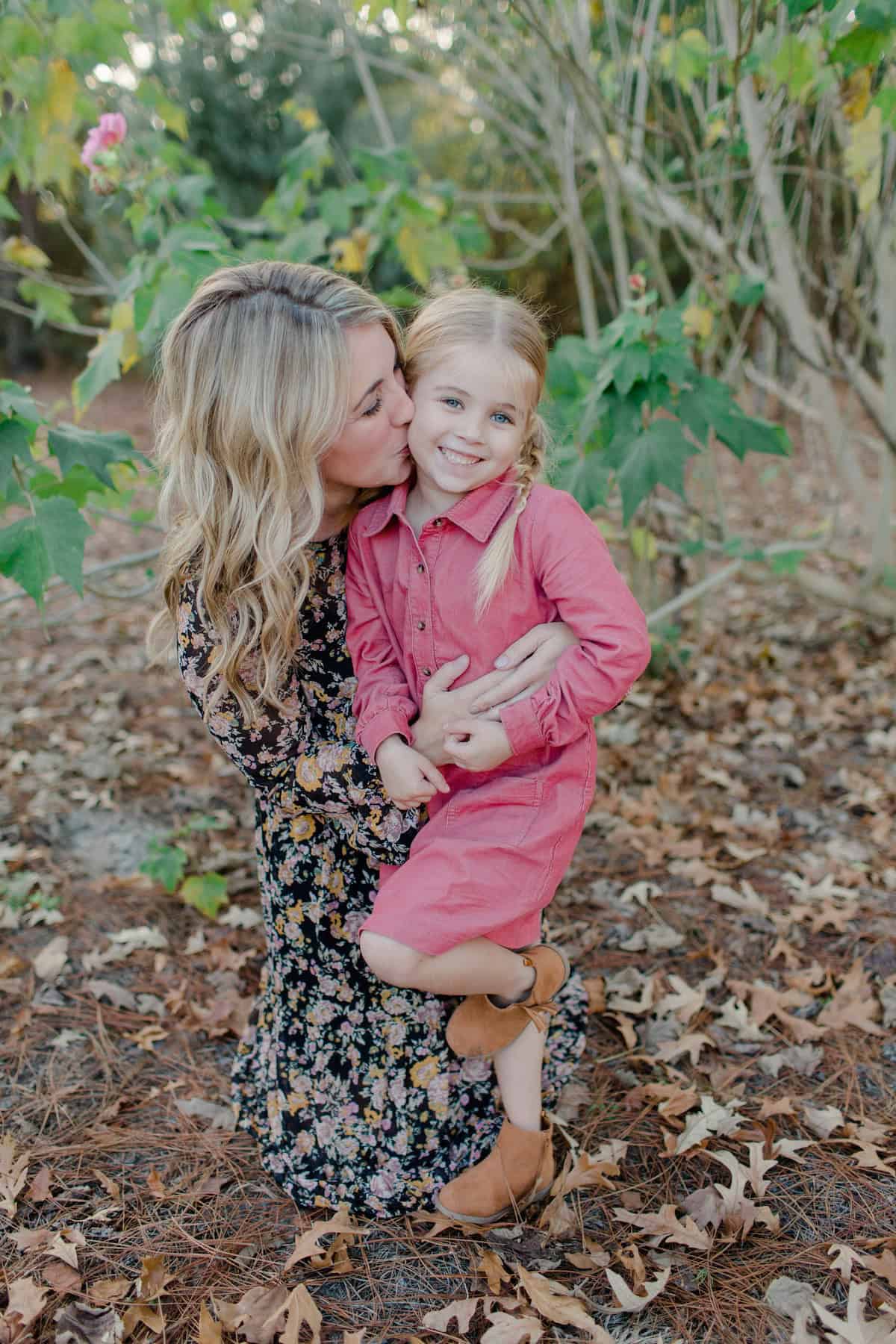
Establish Clear Consequences
Before you can expect your five-year-old to behave properly, the most important thing is to set clear behavioral expectations.
Without firmly establishing those guidelines, your child may have trouble knowing what is right and wrong in the first place.
I try to set my children up for success by clearly communicating expectations as well as explaining what consequences will take place should they choose not to obey the clearly outlined instructions.
For example: “We need to keep the kitchen clean to avoid ants. If you’d like to eat a snack you must sit down in your chair and eat over your plate. If you choose not to sit down to eat then you will have to clean up the crumbs on your own and won’t be able to eat a crumbly snack next time.”
It is also wise to have the child reply with “Yes Ma’am” or “Yes Mommy.” This helps to ensure we are all on the same page and none of the instructions were not heard properly.
If the child then stands and eats and makes a mess I will hand them the broom to sweep up and ask “why do you have to sweep the floor?” By asking the question it gives them the opportunity to learn the lesson by repeating back to me the expectations I had originally set.
It also takes away the “bad guy” and puts the responsibility on the child who didn’t follow through with the instructions that they clearly understood.
When you have established your expectations, you can then clarify the consequences that will take place if your five-year-old begins to misbehave.
The punishments you enforce should not be exceptionally harsh. Instead, you should limit privileges such as playtime or toys when your kid is out of line.
It is also important to “make the punishment fit the crime.” Natural consequences are always the best, whenever possible.
Keep it simple. But be sure to have the punishment be timely. The closer in time to when the infraction occurred, the more likely the lesson is to be remembered and be associated with the misbehavior.
Every child is different; some will respond strongly to time outs, others to losing privileges, others to being isolated for a short time. If a discipline method doesn’t work, don’t give up! There are different ways of handling discipline, so maybe try something else instead.
Regardless of the consequences you put in place, you need to stick to them. If you said it the first time, you meant it, regardless of the temper tantrums that may ensue.
Consistency is also crucial. Failing to follow through will lead your child to not take your potential punishments seriously in the future.
Communicating clear expectations and consequences is the first step towards understanding how to discipline a five-year-old with a strong will. With those guidelines in place, you can begin curbing your child’s bad behavior using the following tactics.

How to Discipline a 5 Year Old: Reward Good Behavior
Knowing how to discipline a 5 year old (or any child, really) is as much about discouraging negative behavior as it is about rewarding good behavior.
As a responsible parent of a five-year-old, you likely have a watchful eye even when your child does not know you are on the lookout. That means that you will have a clear view any time your child does the right thing.
When that happens, you should reinforce those appropriate behaviors as much as you can. Such positive reinforcement could come in one of the following forms:
- Verbal praise
- A tasty treat
- A trip to the playground
- Later bedtime
- Playing a favorite game
While this may not seem obvious, your child may not have a solid understanding of the behavior you wish to see in them. So, when you see your five-year-old acting the way they should, make sure to let them know they are doing a great job.
The positive feedback you provide might motivate your kid to do you proud in the future as well.
There is, of course, a balance to using reward as a discipline tactic. In my opinion, praising is a tool for discipline prevention.
It can be hard when you have a child who frequently misbehaves or is constantly into mischief to notice the moments when they are making good choices. Sometimes it feels like my youngest son hears negativity ALL DAY LONG.
I try to really notice the moments when he does something well. When he follows through with instructions. When he stays on task. When he cleans up without me repeatedly asking him. The more we compliment our children for doing right, the less likely they are to do wrong.
Everyone feels good when been praised. We all want to be seen and valued and appreciated and our children are no different!
We get busy and overwhelmed and so often our children act out in order to get our attention. Simply noticing the good in them can often times help minimize the poor behaviors.
I do believe that bribery has its place in the parenting toolbox, but that it should be very limited in its use.
As children get older and show responsibility and maturity I like to add in fun things like later bedtimes, family games, quality time outings etc.
They shouldn’t be linked with behavior but rather viewed as milestones and rites of passage that are outcomes of positive behavioral norms.
When parenting a strong will child, or one with adhd (as I am in the trenches with myself!), lots of praise for moments of doing good combined with motivation for reward can be powerful as well!
Some children respond best to the anticipation of a postive reward for good behavior rather than motivation out of fear of consequence due to bad behavior. And we want to parent from a place where there is a healthy balance of each.
I live my life from the perspective of both anticipating eternity in Heaven as well as avoiding eternity in Hell. Having both positive outcome rewards as well as negative consequences help guide children in their decision making into adulthood.
Talk at Their Level
At times, the reason that a child misbehaves is due to a lack of communication. Since you are the adult in the room, it is your responsibility to build the parent-child relationship by talking in a way that your five-year-old can understand easily.
Here are a few tips that will help you to get through to your kid:
- Make eye contact
- Use simple language that your child can readily comprehend
- Lower yourself to their level by squatting down or sitting
- Be in the same room
- Cease all other current tasks
Those five tips will send the message to your child that you are focusing on them and them alone. This will help you convey your ideas to your kid so they know you’re acting with their best interests at heart.
Your undivided attention also shows them that you care about their needs. It will also allow you a better chance to learn how to get your five-year-old to listen and behave.
Sometimes, talking at your child’s level will allow you to have a better understanding of their point of view. Only by listening intently to what your child has to say can you acknowledge their needs and desires.
This understanding will make it less likely that future discipline conflicts will arise or that they’ll misunderstand a simple request.
Again, requiring the “Yes Mommy” response helps ensure all parties are on the same page and that the communication has been clear and understood. It can even be helpful to ask the child to repeat the expectation back to you.
This helps ensure they fully understand and also are aware that if they choose not to obey the instruction they know they are choosing to take part in the consequences
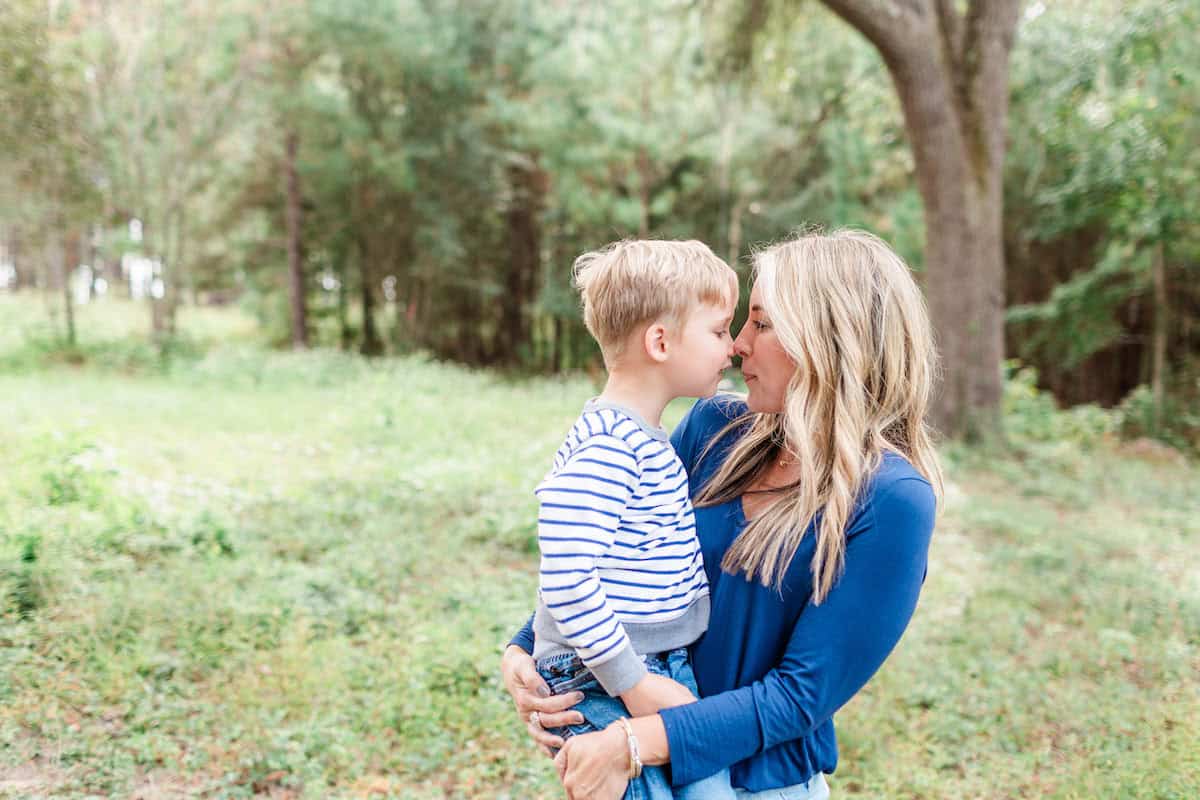
Set the Correct Example
Young children are experiential learners who often pick things up by watching those who are around them. That means that as a parent, it is up to you to set a good example for how you wish to see your child behave.
As the primary authority figures, parents are likely the people that your child views and interacts with the most, meaning your behaviors have an immense capacity to impact your child’s behaviors.
Simply put, if you act in a calm and respectful way even when you meet your own personal frustrations, your five-year-old is more likely to do the same. This form of modeling can be a handy tool as you attempt to alter the bad behavior of your child.
On the other hand, your actions have the potential to breed unwanted behavior in your five-year-old. Even when it is unintentional, a negative outburst that you exhibit could inspire your child to act in the same manner later on.
While monitoring your behavior and that of your five-year-old is a tall order, it is indispensable. You have your child’s attention – you are their role model!
Never underestimate how much your kid takes in just by observing you. And don’t forget to take advantage of that attention by acting as you would want your five-year-old to operate.
And remember that we all make mistakes sometimes – no parent is perfect, and we all lose our cool, some more often than others! (If you want to know how to get better at staying calm as a mother, read about it here!)
Take a deep breath, forgive yourself, and find what works to help yourself stay calm so you can face the same situation again with more composure.
One of the best aspects of parenting is that at the end of the day your child loves you and you love your child – give yourself and each other plenty of grace as you navigate these waters!
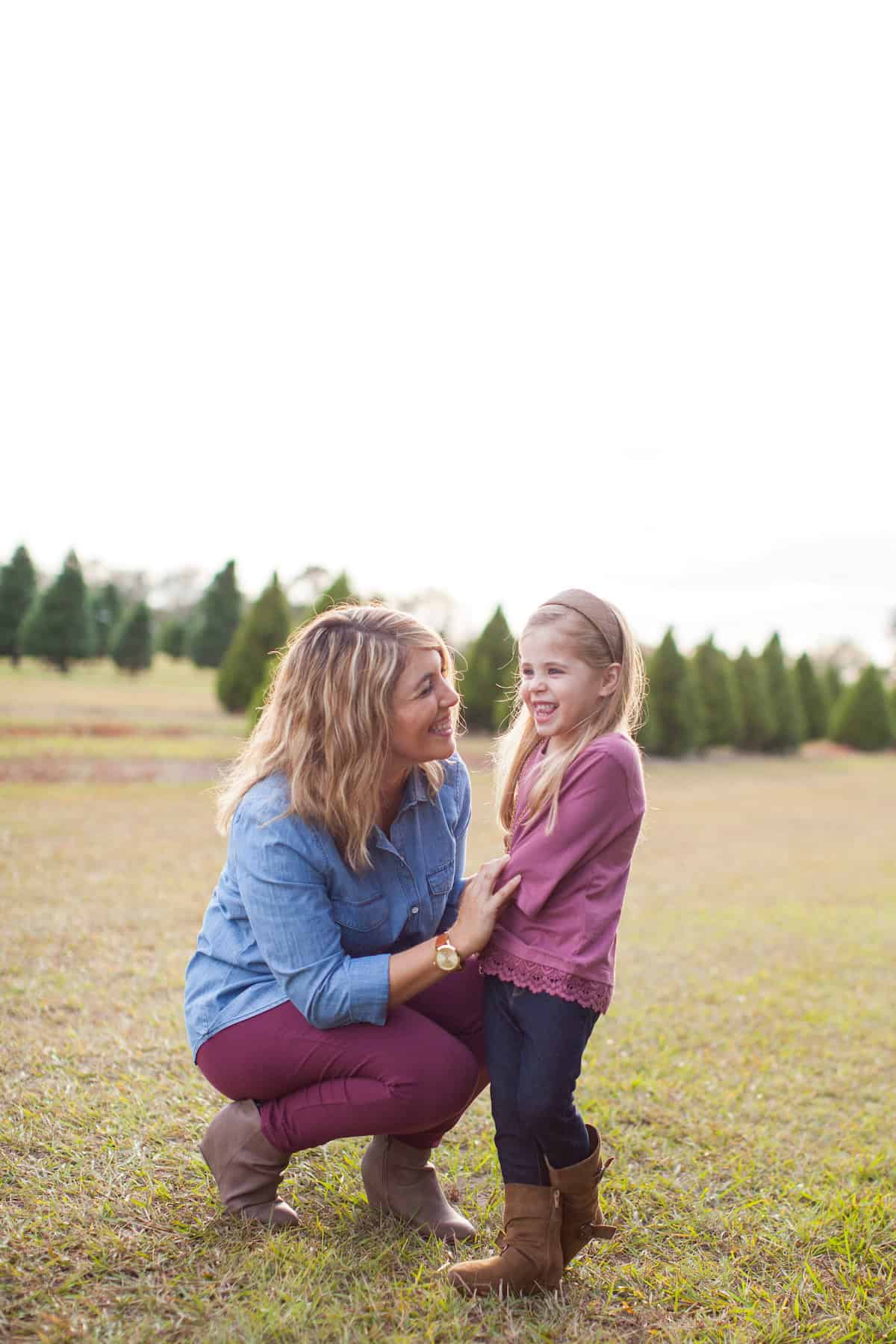
Offer Choices
Strong-willed children have strong opinions! Even those of us who may not be “strong-willed” still appreciate feeling in control of our lives and having the free will to make decisions.
A simple change you can make in your home to help encourage acceptable behavior from your young kids to by helping your child feel like they have control over their behaviors and disciplinary outcomes.
Offering two choices for a child helps give them a sense of independence, and empowerment and teaches them how to make choices with positive outcomes. It is also an excellent way to prevent disciplinary actions from being required!
When giving choices, the key is to only offer two options. This can look different depending on the situation. If it’s time to choose an outfit for school you could pick out two shirts that you’d be okay with the child wearing and then ask “Which shirt would you like to wear – option 1 or option 2?”
This method is especially beneficial, however, when a child is considering a poor decision or negative behavioral action. For example if it’s time to clean up the toys and your child is upset and not wanting to obey you could say “You have two choices. Option 1: Obey Mommy and clean up your toys with a happy heart. Option 2: Continuing pitching a fit, sit in timeout and THEN clean up your toys.”
The child is going to have to clean up their toys either way. However, they can choose which option they prefer – one where they don’t receive disciplinary action or one where they have to.
By offering the child the decision to choose you’re also taking yourself out of the equation. If they choose to continue to pitch the fit and have to sit in timeout, they made that decision. I will remind my child in a calm way that I am sorry they they chose to sit in timeout rather than clean up their toys with a happy heart.
I am also always mindful to be encouraging and tell them the I have full confidence that next time? They will make the better choice!
—-> Read More on the Two Choices Gentle Parenting Discipline Method
How to Discipline a 5 Year Old: Ignore them at the Right Time
This tip may seem counterproductive, but sometimes the best disciplinary action is no action at all. The reason for this is that it is typical for a child’s bad behavior to be nothing more than a cry for attention.
While you should give your kids all the attention they need, you should not do so after they use a negative attitude or action to get it.
Sometimes, giving attention to a kid that is acting out for no other reason than to gain attention is a way of rewarding that behavior. Any time your reward that behavior, you make it more likely to take place the next time your five-year-old wants your time.
At first, it can be difficult to find the self-control to employ this tip. However, after a few instances of bad behavior, your child may begin to learn that throwing a tantrum is not an effective way to get what they want.
A part of you may also find it cruel to ignore your child when you feel they are in need. Of course, you will need to use your judgment and knowledge of the situation to determine your course of action.
If you recognize that your five-year-old is acting badly for no other reason than to get attention, ignoring them will only help you and them in the long run.
When these attention-seeking behaviors take place I see it as an opportunity to make adjustments. Am I giving my child enough positive attention? Am I spending enough quality time with them?

Teach the Child to “Make it Right”
Often poor behavior choices made by children have an impact on others. Along with natural consequences, a way to help combat negative behaviors is to teach children to make it right.
Little things go a long way. If a child owes an apology for an offense, make sure they give it. If something was broken, make sure they repair it.
While younger children may not have the financial means to replace items, they can help in the process of purchasing the replacement as well as participate in some sort of act of service to help “right their wrong.”
I find it’s important to remind my children that they are not “bad kids” but they are children who need guidance and who will never be perfect. We all fall short. We all fall victim to sin.
And poor choices have consequences. Taking ownership and responsibility when we wrong someone else is an important character trait that will help children build a positive relationship with their peers and family members into adulthood.
Take a Positive Approach to Discipline
This final tip is a bit broad and applies to nearly all the other tips we have listed so far. One of the best approaches you can take when learning how to discipline a 5 year old is to remain positive in your thoughts, language, and actions.
Peaceful parenting doesn’t mean allowing your child to rule your household. You can require good behavior while still obtaining mutual respect and a positive relationship with your child.
Constant power struggles and negative behaviors don’t help foster positive relationships for your child with their peers, siblings, family members, other adults, or yourself.
I know with my own strong-willed temperament child that when my child’s behavior is negative, it is hard for me to want to spend a lot of time seeing how much fun we can have together.
Having clear boundaries, logical consequences, and consistency IS positive parenting that will bring about positive change in your daily life with your child.
Yes, reward good behaviors! Yes, build your child up with their self-esteem. Yes, encourage their unique personality traits and love them for who they are. But also guide them to be the best versions of themselves that they can be.
Discipline isn’t a “bad word.” Disciplining our children is an act of love and our desire as wise parents to raise our children up to be wonderful members of society.
The strong wild children may give us a run for our money but they will, with our guidance and direction, become great leaders someday!
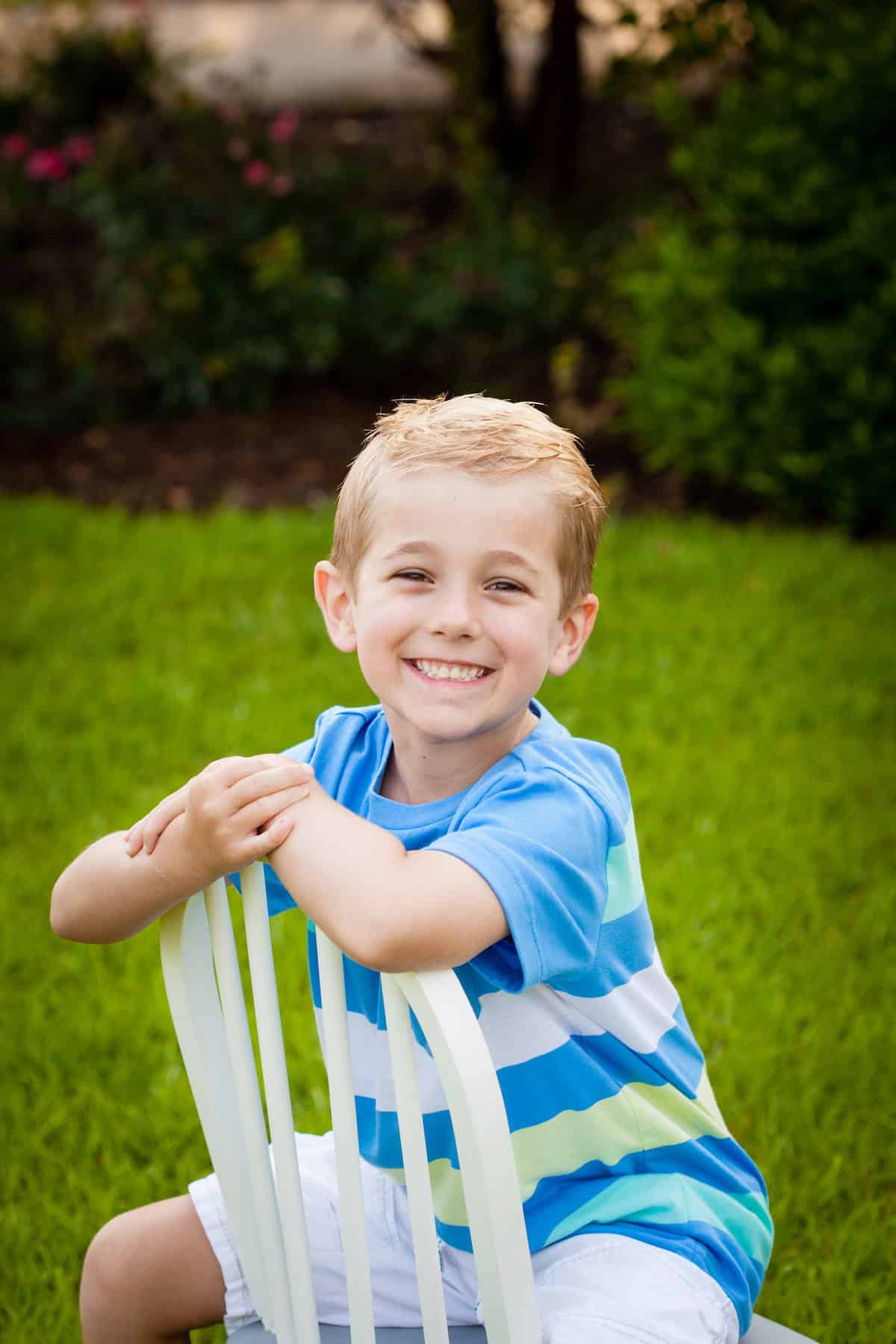
Disciplining a 5 Year Old With ADHD
My youngest (and currently newly 6 year old) son was diagnosed with ADHD this past year. With attention struggles combined with being a typically 5-year-old kid and having a touch of a strong-willed child mixed in I needed to learn some new skills for approaching parenting him in an appropriate way to suit his unique needs best.
He is the youngest of our four children and therefore looks up to the older kids both as his example for our family expectations as well as an example for positive behavior.
However, I have had to learn some new things and have a bit of a different approach when it comes to being a good parent for his specific needs and the most effective ways to manage the behavioral problems that come about with his struggles to be able to stay on task, stay focused, or avoid impulses.
Routine is very crucial for him, especially at bedtime and in the mornings before school. Having a consistent routine and structured schedule with simplified basic rules and easy to follow simple tasks in place help to keep him on task.
I do my best to implement positive discipline strategies with him as I know a child with ADHD tends to hear more negative feedback than those who don’t have similar struggles.
It is often tough to not feel overwhelmed and frustrated in the heat of the moment.
I have found effective discipline with him to also incorporate a bit of a breather and break for myself. It allows us both to remain calm!
Not only is consistency extremely important, but having immediate consequences is especially critical for my son. I cannot ever offer empty threats and must follow through no matter what different situations may arise.
I have also found that the best motivator for him to make better choices is the loss of privilege. Using the two choices method I mentioned previously combined with following through with a loss of privilege helps him to stay on task and make more positive choices.
As he gets older I also utilize longer time-outs. Setting a timer so he can both visually see and hear the time. This gives him a chance to work through his big emotions and a chance for me to step away for a moment to breathe so I can come back to the situaiton with a clear mind.
The most important factor is to always make sure all of my children know that no matter what they can count on me for unconditional love and support and a safe space for them as they learn and grow!
—–> Tips to be a calm mom during parenting moments of frustration
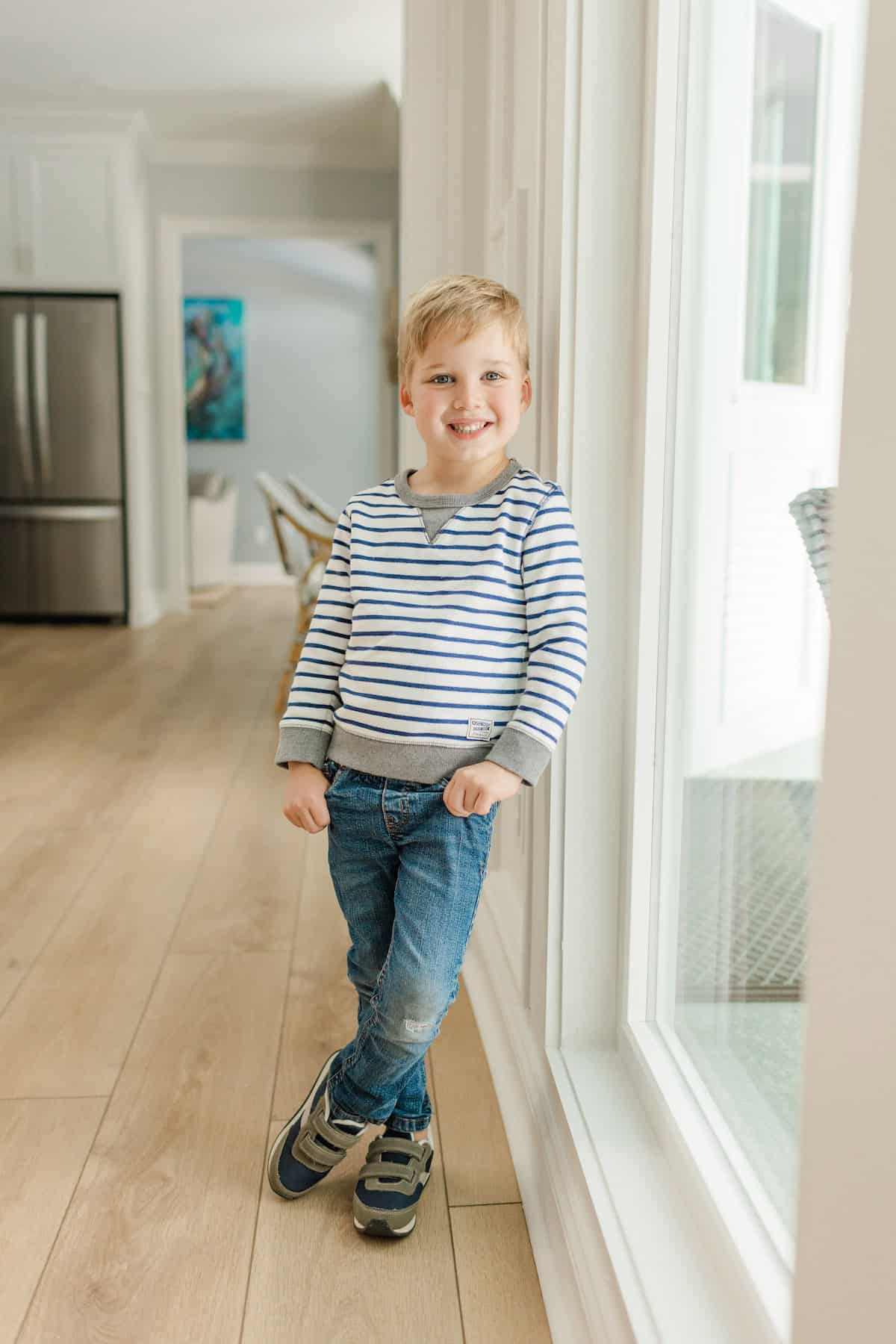
How to Discipline a 5 Year Old: Conclusion
It’s no secret that parenting at any age is full of joys and challenges. One of the main issues that mothers and fathers face at younger ages is their child acting out with poor behavior.
If this is an issue for you, know that there are plenty of resources that can help you get through your parenting struggles and learn how to discipline a 5 year old without unnecessary frustration.
The best way to discipline a child is to prevent disciplinary actions from being needed. A key to setting a child up for success is to prioritize their sleep schedule. Make sure they are getting the rest they need each night to start the day off in a positive way!
Another key to preventing a need for disciplinary action is to avoid parenting outside the funnel. This concept is introduced in the Babywise book series and discussed in Childwise.
—-> I further discuss parenting inside the funnel in this post.
The goal is to make sure your child is given age-appropriate freedoms. Often when a child is making poor decisions it is evidence of a greater problem – the problem of too many freedoms.
It is unfair for a child to be allowed freedoms beyond which they are developmentally ready for and can lead to many undesired behaviors.
By making sure a child has a healthy diet, plenty of sleep, guidelines for their allowed freedoms, recognition of positive behaviors, and consistent redirection when they exhibit negative behaviors even a child with a strong-willed temperament will soon be making positive choices!
Using positive language, a calm tone of voice, having good listening skills, modeling good manners and your family house rules, and implementing effective consequences will all help kids to minimize disrespectful behavior and the need for negative consequence from the youngest child up to the teen years to come!
Just remember that parenting at any age is a constant learning process, don’t be too hard on your child in their stages of learning and growing. But also be sure to be kind to yourself as you are learning and growing too!
Additional Posts You’ll Find Helpful
- 6 Methods of Correction
- Helping Children Cope with Big Life Changes
- Helping Children with Bad Dreams
- Parenting Quotes for Hard Times
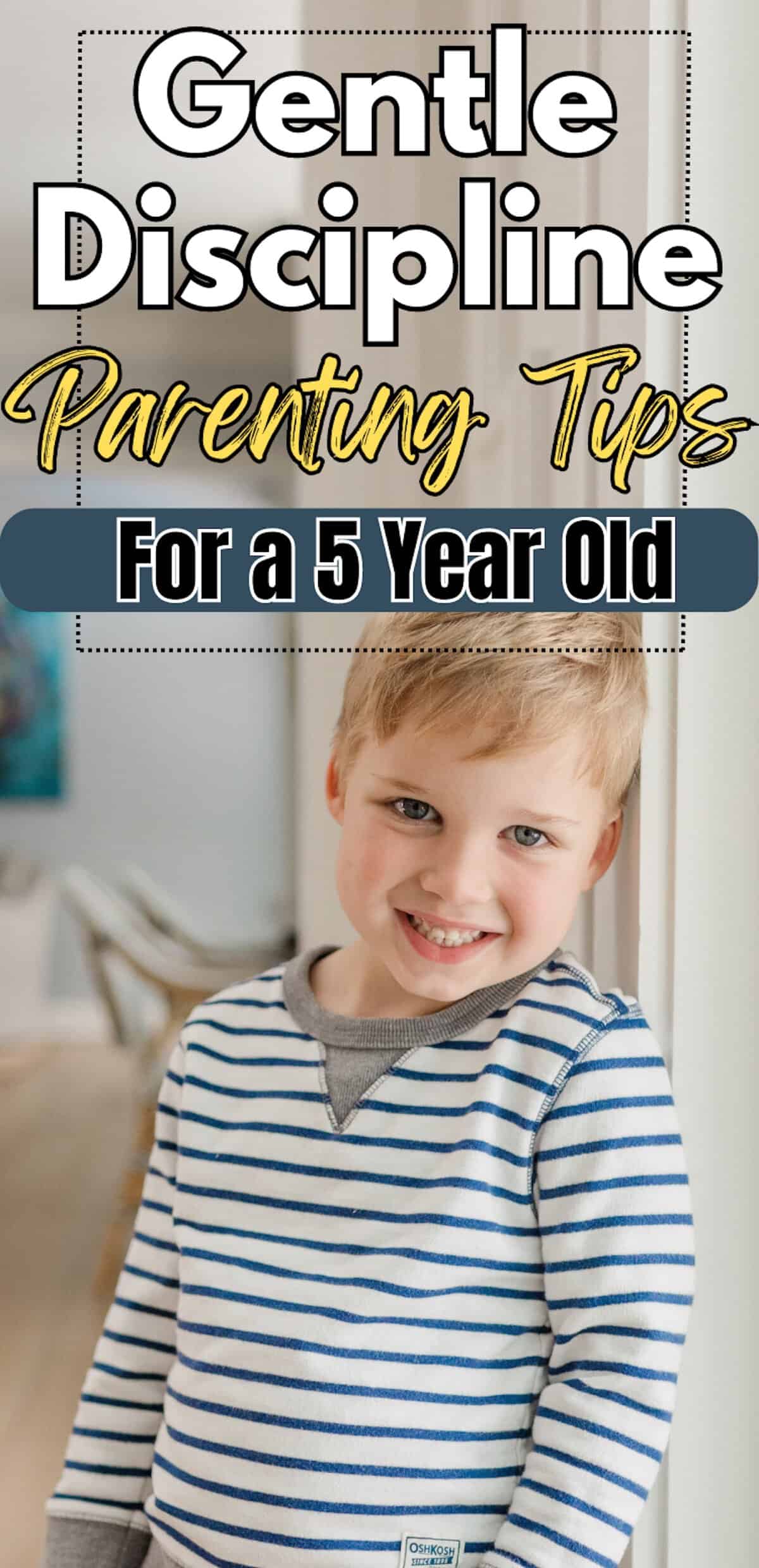
- A Letter to my Son on His 16th Birthday From Mom (Kye’s Bday Letter) - March 20, 2025
- Open Letter to my Daughter on her 12th Birthday – Love, Mom {Britt’s 12th Bday Letter} - January 16, 2025
- Letter to My Son on his 6th Birthday – Love Mom - January 8, 2025






